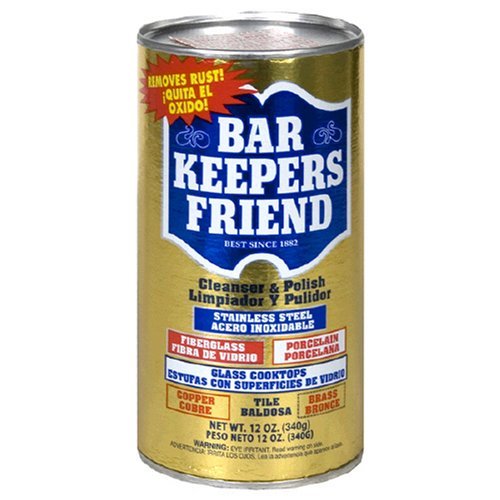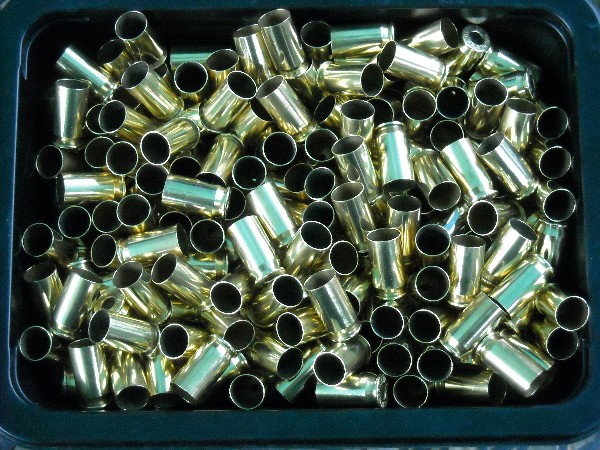You are using an out of date browser. It may not display this or other websites correctly.
You should upgrade or use an alternative browser.
You should upgrade or use an alternative browser.
Poor man's brass cleaning ?
- Thread starter 06shooter
- Start date
Deprime first. Put half a gallon of water, a small squirt of dishwashing liquid, and a teaspoon of citric acid in. Add brass half way up (should be covered by the liquid plus whatever liquid was displaced), cap the lid and agitate for a minute by tilting the jug back and forth. Let sit for fifteen minutes. Agitate for another minute. Drain the liquid into the toilet (you don't want it anywhere near a food prep area because of the lead in primer residue), rinse the brass a couple of times, put the cases out on a rag towel and let them dry for a couple of days.
4runnerman
New member
2 parts water, One part White Vinager,2 tbl spoons baking soda. It will foam up so have a big container. Stir every 4 or 5 minutes. Do this for maybe 20 minutes and rinse. Rinse very good. It's amazing how good that mix works
the led farmer
New member
...
What about citric acid from a grocery store ?
Same thing as lemishine.
Unclenick nailed it. I used to use a five gallon bucket, hot water, dish soap, citric acid and a stick before I inherited a rock tumbler.
So long as your brass is free from foreign debris there is no good reason to clean brass other than aesthetics, but if you want cheap there it is.
chris in va
New member
I started with a bucket and hot water with white vinegar. Keep in mind you'll need to either leave the cases under a fan overnight or put them in an oven for an hour to dry them out.
I've since graduated to a Harbor Freight tumbler and their walnut media.
I've since graduated to a Harbor Freight tumbler and their walnut media.
the led farmer
New member
...
are you saying the powder residue doesn't matter ?
Nope it doesn't. People were reloading quality ammo long before tumbling brass became popular. Cleaning brass is a nice to have not a need to have. That being said I like to have shiny brass, so I wet tumble.
I actually use the carbon residue to my advantage, I resize decap fired brass before I wet tumble. The carbon acts like a lubricant, straightwall cases run smooth and bottleneck gets a blast of one-shot. Saves me a step.
If you run squeaky clean brass though the resizer you increase the chance of galling.
When I started out I used a liquid brass cleaner from Birchwood Casey, it worked very well and very quickly - like a 3-4 minute soak (no more) and then a good rinse. I still use it as a pre-wash for .223 brass that has been fired with a suppressor, as those cases simply will not get clean with the corncob media I prefer to use in the tumbler. It's economical as once you mix the solution, it will keep nearly indefinitely in a small plastic bucket with a lid, and wash thousands of cases. Only real drawback is you do have to wait for the cases to fully dry (you can speed them along with a hair dryer) before loading. I eventually bought a basic vibration tumbler because often I want to clean and load the same night and didn't want to risk moisture in the case.
FrankenMauser
New member
As long as it's pure citric acid, it'll be just fine.06shooter said:What about citric acid from a grocery store ?
I had quite a difficult time finding some in my area, a few years back. Even the food storage, restaurant supply, and canning supply places didn't have any. And it was stupidly expensive online.
Finally, I found a candy and cake supply shop that sold it in 5 lb bags. I didn't need that much, but I got 5 lbs of pure, food-grade citric acid for less than I could have paid for 8 ounces online.
Since it's more than I'll use in the next 20 years, I also use it when I get bored. 1 part citric acid + 3 parts sodium bicarbonate (baking soda) + gigantic veterinary capsule* + bottle of warm water = fantastic reactive target. (Via carbon dioxide release.)
Mix dry ingredients and fill capsule. Insert into bottle. Walk back to the firing line and wait for the capsule to dissolve.
When bottle suddenly begins to RAPIDLY pressurize, put a bullet into it.
BOOM!! ....And the chemical solution released won't hurt anything. It's less harmful than Coke. Just pick up the pieces of the bottle(s) when you're done.
*The veterinary capsules that I use are massive. They're 1" in diameter and 3" long (24mL, Torpac #007). About 5 years ago, I calculated that a citric acid / sodium bicarbonate capsule in a sealed 1 pint aluminum beer bottle with no air gap could theoretically pressurize the vessel to almost 4,500 psi; or easily 450 psi with a minimal air gap (something like 1"). Aluminum bottles are only pressure tested to 50 psi or 75 psi (often 75-150 psi for plastic), depending upon the design; so capsules that massive are definitely not necessary and completely negate any chance of 'priming' before transport.
A tumbler and some walnut media
Yep, and when you get one from Harbor Freight that does not say "Lyman" or "RCBS" on it, they are prettty cheap.
06 Shooter,
Getting dirt and grit off brass is the main reason for cleaning before sizing. It prevents the die from getting scratched. However, the hardened carbon in the primer pocket residue can eventually do some scuffing anyway, which is why I like to decap and clean first.
I think Frankenmauser probably never happened onto the site I linked you to, above. Because their price includes postage, at $25 for 10 lbs, it's the cheapest source of citric acid I've found anywhere, short of buying a 50 lb bag from a local chemical supply outfit. 10 lbs will last you for what seems like an eternity.
If you want to reuse your solutions for awhile rather than flushing them, mix the old arsenal brass cleaning solution of 5% by weight in water and use it until it stops working.
After rinsing, to avoid water marks, put a cup of distilled water into the jug with the still-wet cases, and rotate the jug around until the DW has had a chance to find and mix with the tap water drops.
The Lee Universal Decapping and Depriming Die will let you decap the brass first. This keeps water from being trapped in a primer pocket by an old primer. It also lets the acid work on the primer residue to at least reduce it.
Compared to vinegar, citric acid has a couple of plus factors. The reaction seems to be self-limiting and the resulting surface remains yellow, where vinegar cleaned brass tarnishes pretty hard after a couple of weeks. The reason for the difference is vinegar leaves the metal surface somewhat activated, while the citric acid cleaned surface is effectively pretty well passivated. That means it doesn't oxidize easily which means it's a very good surface for weather resistance and for long-term storage of the brass or its loaded rounds. It's even better for that than highly polished rounds achieve.
Compared to a highly polished, you also have less tendency for the case neck to "cold solder" to bullets, which is actually a corrosion process, too. For match loads, to keep bullet pull consistent, I take a bore brush and turn it inside the case mouths to get carbon off (drill press running slow is great for this), then subject it to the citric acid cleaning.
Getting dirt and grit off brass is the main reason for cleaning before sizing. It prevents the die from getting scratched. However, the hardened carbon in the primer pocket residue can eventually do some scuffing anyway, which is why I like to decap and clean first.
I think Frankenmauser probably never happened onto the site I linked you to, above. Because their price includes postage, at $25 for 10 lbs, it's the cheapest source of citric acid I've found anywhere, short of buying a 50 lb bag from a local chemical supply outfit. 10 lbs will last you for what seems like an eternity.
If you want to reuse your solutions for awhile rather than flushing them, mix the old arsenal brass cleaning solution of 5% by weight in water and use it until it stops working.
After rinsing, to avoid water marks, put a cup of distilled water into the jug with the still-wet cases, and rotate the jug around until the DW has had a chance to find and mix with the tap water drops.
The Lee Universal Decapping and Depriming Die will let you decap the brass first. This keeps water from being trapped in a primer pocket by an old primer. It also lets the acid work on the primer residue to at least reduce it.
Compared to vinegar, citric acid has a couple of plus factors. The reaction seems to be self-limiting and the resulting surface remains yellow, where vinegar cleaned brass tarnishes pretty hard after a couple of weeks. The reason for the difference is vinegar leaves the metal surface somewhat activated, while the citric acid cleaned surface is effectively pretty well passivated. That means it doesn't oxidize easily which means it's a very good surface for weather resistance and for long-term storage of the brass or its loaded rounds. It's even better for that than highly polished rounds achieve.
Compared to a highly polished, you also have less tendency for the case neck to "cold solder" to bullets, which is actually a corrosion process, too. For match loads, to keep bullet pull consistent, I take a bore brush and turn it inside the case mouths to get carbon off (drill press running slow is great for this), then subject it to the citric acid cleaning.
madmo44mag
New member
Citric acid can be found at brew shops locally or on line.
Very cheap.
Very cheap.
FWIW, Harbor Freight rock tumblers are a pretty good entry level tumbler. My first go at tumbling was with a HF single drum tumbler (I reloaded 12 years before I started tumbling. I merely wiped each case with a solvent dampened rad as I inspected it. I inspect every case I reload). That tumbler lasted over 20 years until I "improved" it...


